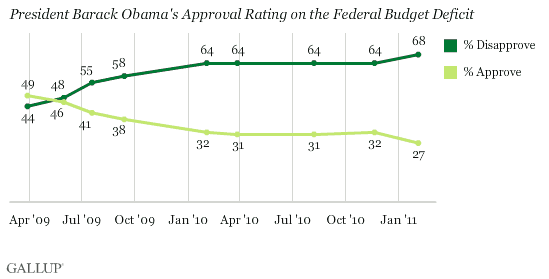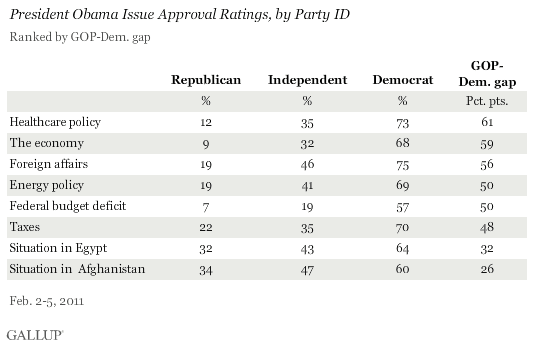PRINCETON, NJ -- President Barack Obama's approval rating for handling the federal budget deficit has gone from bad to worse in recent months, even as his ratings on all other major national issues have generally held steady. Currently, 27% of Americans approve of Obama on the deficit, down from 32% in November, while 68% disapprove.

Overall, Obama is doing much better on international issues than domestic ones. Among eight issues on which Obama was rated in the new poll, Americans give the president the highest approval ratings on foreign affairs and the situations in Egypt and Afghanistan. The deficit, the economy, and taxes rank among his lowest ratings, alongside healthcare policy.
The survey was conducted Feb. 2-5, as the Obama administration was stepping up pressure on Egyptian President Hosni Mubarak to make a decision about continuing to lead his country in light of mass protests calling for his immediate resignation -- protests with which Americans generally sympathize. The relatively small percentage disapproving of Obama on Egypt (32%) makes his overall net approval on that issue the highest of any issue tested, at +15 percentage points.
![Do you approve or disapprove of the way Barack Obama is handling [issue]? February 2011](http://content.gallup.com/origin/gallupinc/GallupSpaces/Production/Cms/POLL/l8a3w6mcjkofbperss5yvq.gif)
Healthcare, the Economy Spark Greatest Political Polarization
Democrats' disapproval on the deficit is a key reason Obama does worst on that issue. It is the only issue on which fewer than 6 in 10 Democrats approve of his performance. By contrast, about three-quarters of Democrats approve of Obama's handling of healthcare and foreign affairs.
Varying degrees of political polarization are seen in Obama's issues ratings. Democrats and Republicans show the most widespread disagreement about his handling of healthcare policy and the economy -- with roughly 60-point gaps -- while they are closer in how they rate his handling of Egypt and Afghanistan.

Independents are closer to Republicans than to Democrats on the two most polarizing issues -- healthcare and the economy. Independents come even closer to GOP views with respect to the federal budget and taxes, making these potential problem issues for Obama when it comes to garnering independents' support in the next election. However, on four other issues -- foreign affairs, energy policy, Egypt, and Afghanistan -- independents' views fall at about the midpoint between Republicans' and Democrats' views.
Bottom Line
President Obama has failed to build public support in recent months for his handling of major U.S. economic matters, despite a generally well-received State of the Union address in which he proposed a federal spending freeze to help put the brakes on deficit spending. His approval rating on the economy is no better than it was last fall, and his approval rating on the federal budget deficit -- a top issue for Republicans in Congress since the midterm elections -- is even worse. His broadest support on the issues comes on foreign policy matters, most notably the situation in Egypt, but even on these, his approval ratings register just below 50%.
Explore President Obama's approval ratings in depth and compare them with those of past presidents in the Gallup Presidential Job Approval Center.
Survey Methods
Results for this Gallup poll are based on telephone interviews conducted Feb. 2-5, 2011, with a random sample of 1,015 adults, aged 18 and older, living in the continental U.S., selected using random-digit-dial sampling.
For results based on the total sample of national adults, one can say with 95% confidence that the maximum margin of sampling error is ±4 percentage points.
Interviews are conducted with respondents on landline telephones (for respondents with a landline telephone) and cellular phones (for respondents who are cell phone-only). Each sample includes a minimum quota of 150 cell phone-only respondents and 850 landline respondents, with additional minimum quotas among landline respondents for gender within region. Landline respondents are chosen at random within each household on the basis of which member had the most recent birthday.
Samples are weighted by gender, age, race, education, region, and phone lines. Demographic weighting targets are based on the March 2010 Current Population Survey figures for the aged 18 and older non-institutionalized population living in continental U.S. telephone households. All reported margins of sampling error include the computed design effects for weighting and sample design.
In addition to sampling error, question wording and practical difficulties in conducting surveys can introduce error or bias into the findings of public opinion polls.
View methodology, full question results, and trend data.
For more details on Gallup's polling methodology, visit www.gallup.com.
